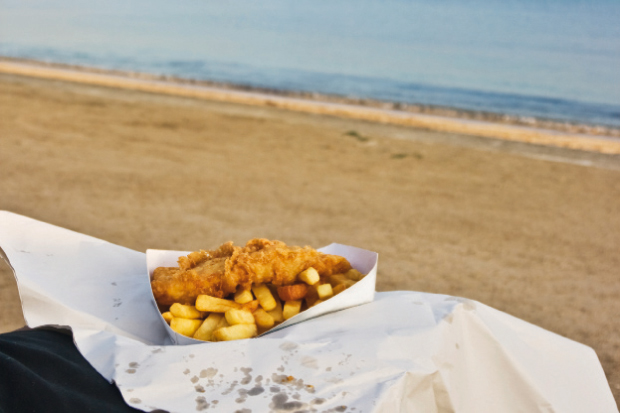During the D-day landings, members of the parachute regiment, finding themselves behind enemy lines at night, needed a way of telling whether someone nearby was friend or foe. Their solution was a pair of codewords: one man would call out ‘fish’, the other replied ‘chips’.
Brits seem to reach for the words as easily as we reach for the food itself. My Latin teacher used them to illustrate how the alternative to ‘et’ works (‘fish chipsque’), while people impersonating the Kiwi accent need only say ‘fush and chups’. The meal is deeply embedded in our national psyche. John Simpson, we learn in this book, pined for it during the siege of Sarajevo. When George W. Bush accompanied Tony Blair to a pub in Sedgefield he ate fish and chips with mushy peas. In 1977 British chippies got through 2,000 tons of potatoes per day.
Panikos Panayi is an academic, something which shows through in the book’s dryness. Social and food historians should enjoy it — the rest of us might have preferred a splash or two of vinegar over proceedings. Even so, there’s the occasional gem. The first recorded use of the word ‘chips’ as applied to potatoes was by Charles Dickens in A Tale of Two Cities. In France the film East is East was released as Fish and Chips (that being the business run by the British Pakistani family it concerns). A 1930s fleet of fish-and- chip vans in Bedford was called ‘the Frying Squad’. Modern premises carry on the tradition with names like ‘The Codfather’ and ‘A Salt and Battery’. (Perhaps none, however, matches the genius of the mobile kebab shop in Bristol called the ‘Jason Donervan’.)
What’s the future for this British institution? Curries and Chinese takeaways have certainly tested our loyalty: there were 25,000 fish-and-chip shops in the 1920s (Pictons in Margate seating 700 people at a time), but only 8,600 by 2003.








Comments
Join the debate for just £1 a month
Be part of the conversation with other Spectator readers by getting your first three months for £3.
UNLOCK ACCESS Just £1 a monthAlready a subscriber? Log in